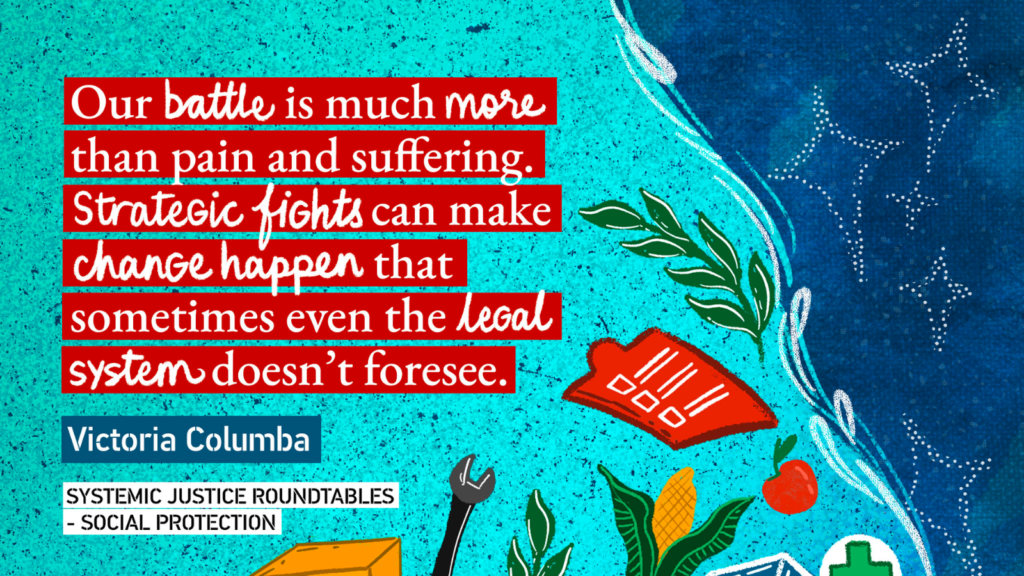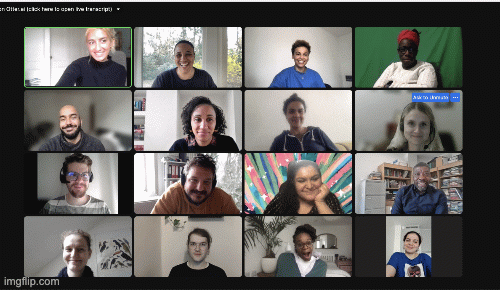
Before we can fix systemic injustices, we need to understand them. One of the key elements of our community-driven approach to strategic litigation that challenges climate, racial, social, and economic injustices is undertaking research to reveal how these injustices are experienced by marginalised communities across Europe. By design, our research methodologies recognise the interconnected harms of climate injustice, lack of access to justice, policing, racism, social unprotection and lack of freedom of movement.
Data-politricks
In our report, Surfacing Systemic (In)justices: A Community View, organisations, movements, and collectives (OMCs) consistently highlighted two research-related themes of concern. First, they noted the absence of reliable research data and information that authentically communicated their experiences of systemic injustice, which is a barrier to their advocacy and campaign goals.
Second, OMCs spoke of having to contend with the daily material effects of injustice, while simultaneously being targeted by and exposed to negative “research-informed” narratives produced by and in the interests of multi-governmental institutions, large non-governmental organisations, and private corporations, with little regard for the consequences that such discourses pose for racially, socially, and economically marginalised groups and communities. For critical researchers Clarke, Chadwick and William such research reproduces decontextualised and dehistoricised explanations of injustices that deny structural inequalities, and is deliberately (mis)used and abused by politicians and state institutions to evoke “folk devils” to create contemporary moral panics in response to political and economic crises of their making.
Historically, qualitative social research was read as a metaphor for colonial knowledge, being central to the development and legitimisation of European imperialism and colonialism. Such approaches remain bound up within European imperial projects, serving in the ontological construction and reproduction of a racialised Other. At Systemic Justice, we regard such approaches to research knowledge production as a violent form of research, one which silences and invisibilises those who are harmed by structural injustice, and politically legitimises discriminatory government policies and practices.
“Making the invisible, visible”: the call for a cause-driven interventionist research agenda
There is an urgent need for research that, from design acknowledges systemic harms as interwoven within the unequal structures of contemporary European societies. While we recognise the contradictions of centralising research that historically has served to subordinate “the Other”, we draw upon the legacies of pioneering researchers who took up the challenge to “make visible the invisible.” For example, writing in 1892, Ida B. Wells chronicled the lynchings of African American men in her autobiography titled Crusade for Justice. At a risk to her personal safety and working within a violently racist context, with no empirical data, Wells embarked on a process of working with bereaved relatives, recording and documenting the lives of those children and young men who were killed. Her work marks an exemplar in radical inquiry, serving to disrupt the predominant narrative which claimed the lynching of Black men was driven by Black criminality. In her final analysis, Wells found that:
“[T]he logic of lynching was not criminal; it was economic. Lynching and mob violence were tactics of economic subordination, used to protect white economic power and to ensure a captive black labor force.”
This is radical inquiry. It is an approach undertaken to deliberately surface the underlying causes of injustice, contributing to a counter-narrative that challenges the dominant narratives that defend injustice. From this position, the object of study at Systemic Justice is climate, racial, social, and economic injustice. Cause-driven, interventionist, and community-driven research is crucial to justice movements and campaigns. Such research approaches are founded upon the values of “being there, of bearing witness, of building relationships with groups and campaigns engaged in resistance and acknowledging injustice.”

Moving forward: Revisiting Systemic (In)justices across Europe
Undertaking and delivering research into the experiences of those who are at risk of systemic injustice is crucial to informing and guiding legal action and driving forward community-driven strategic litigation projects. We resist and oppose the “cause looking for a client” approach, instead working in solidarity with movements and collectives over time, while adhering to non-extractive community-led methodologies (we will be focusing more on that in our next research blog post).
Building on our first community consultation, we have now begun our second project of Revisiting Systemic (In)justices across Europe, with the central aims to:
- provide marginalised communities across Europe with community-focused research knowledge on the harms of systemic injustice, and explore opportunities for action toward justice;
- contribute to building the research and knowledge power of OMCs to influence and shape community-driven legal and strategic litigation projects to challenge systemic injustice;
- incorporate a particular focus on the intrusion of data-driven pre-emptive and predictive technologies to inform policies and practices on the future of tech that perpetuates injustice across Europe.
The next steps for the project will involve focusing on the regions and communities that were under-represented within the Surfacing Systemic (In)justices project, and collaborating with OMCs, scholar activist, and critical researchers committed to tackling injustice across Europe. Our multi-staged, non-extractive design for the project will also allow us to share together and give voice to the stories and testimonies of those who experience injustice and to authentically document their challenges. We will pay particular attention to the convergent harms of climate justice, access to justice, policing, anti-racism, social protection, and freedom of movement, alongside the hardwired and concealed harms of technologies that compound and exacerbate pre-existing injustices.
Taken together, our research agenda recognises the necessity of knowledge, information, and data as critical components toward the development of community-driven strategic litigation for climate, racial, social, and economic justice. Like the Wells study cited above, it is only through the gathering of stories and testimonies, and documenting contextualised accounts of systemic injustice that we can build the knowledge that advances our understanding of injustices and our cause.
